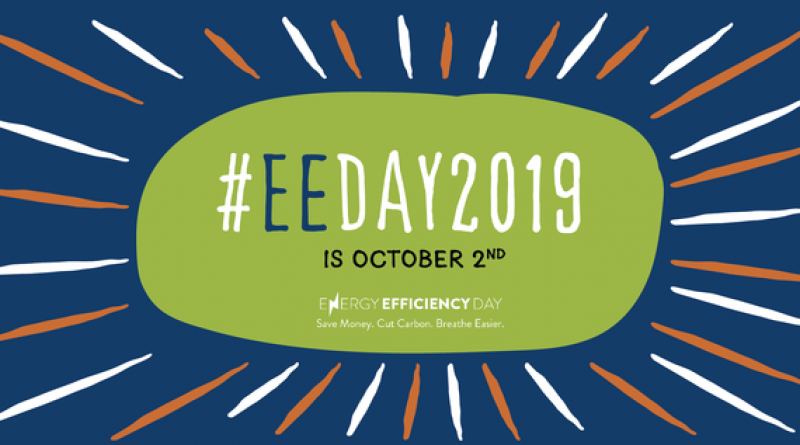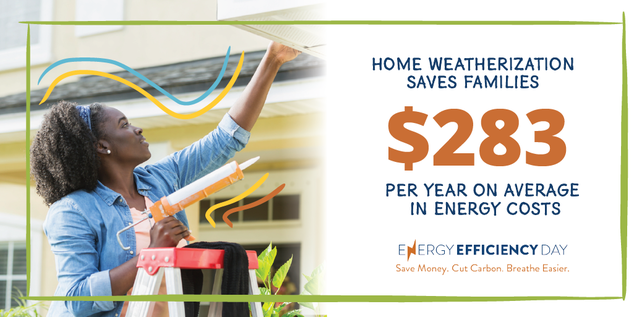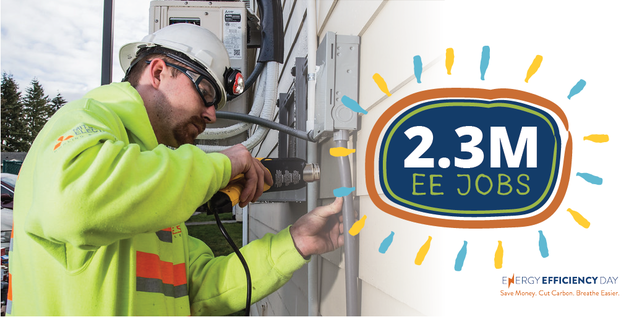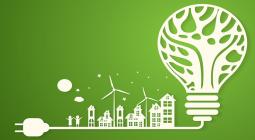Want a Healthy Planet? Put Energy Efficiency to Work!

Energy efficiency is the most cost-effective and comprehensive solution to solving the climate crisis–and it can help improve our health, cut energy bills, and address equity challenges. But some skeptics still contend the benefits aren’t real and others pit efficiency against the economy or other clean energy resources, like solar.
These arguments are short-sighted and must be abandoned if we want a livable planet in the future. It’s important to set the record straight, especially today–the fourth annual celebration of Energy Efficiency Day.
Isn’t energy efficiency a myth since it can’t be measured?
Energy efficiency–using less energy for our appliances and buildings while still enjoying comfortable, functional homes and businesses–is not only part of a larger strategy to stave off climate change, it’s also the cheapest way to keep our lights and air conditioning working.
While you can’t see efficiency like a power plant spewing toxic pollutants, you can see its effects in increased comfort and lower bills–and it can be measured. When done right, it also can avoid the need for expensive utility substation and transformer upgrades (which leads to very real cost savings on your bill).
Isn’t efficiency only available to some people?
Efficiency options are everywhere, including simple choices like switching out a light bulbfor a more efficient LED, medium-effort options such as replacing appliances, and more comprehensive options like upgrading a whole building.
Tips abound for what you can do at home, including when it’s warm out or cutting wasted energy from gadgets with an “always on” mode, and for how youth can take action to make a difference (even in their dorms).
For customers that have a harder time paying for upfront costs of efficiency improvements that produce significant savings down the road, there are numerous programs that can help, including options for low-income residents. Plus establishing minimum appliance standards means that the most affordable and efficient options are available for purchase (decreasing energy bills).
Do we still need efficiency if the electric grid is getting cleaner?
Some may claim that since the electricity grid is getting “cleaner” (meaning more electricity is generated with renewable energy or other zero-emitting fuel sources), it doesn’t matter how much energy is used. That is simply not true:
- Although the electricity grid is relatively “clean” (and rapidly improving) in places like California and the Pacific Northwest, many areas still rely heavily on coal and natural gas.
- Even in places where electricity is primarily generated with zero-carbon sources, there are still numerous benefits from efficiency, including better health, more comfortable and resilient buildings, and lower utility bills. (We recently outlined these–and more–benefits.)
- Most Americans today heat their homes with natural gas or other fossil fuels, not electricity, so improving building efficiency will directly reduce fossil fuel consumption as we transition to cleaner heating sources, like electricity-powered heating options.
- Improving a building’s efficiency can also help save on heating and cooling costs, which is especially important for low-income customers who spend adisproportionate amount of their income on energy bills.

Do we need efficiency when renewables are so cheap for utilities to purchase?
This point is so important that we’re going to put it in bold: To avoid the worst impacts of the climate crisis, we need massive amounts of energy efficiency AND renewable energy to meet customer needs and avoid carbon pollution.
Given the urgency to solve the unprecedented emergency facing us, it is counterproductive to argue for one over the other. Here are some of the benefits of efficiency and renewables when they work together:
- Efficiency allows available funding for customer solar programs to stretch further when you need a smaller system to serve the building’s need, which means each project is cheaper.
- Particularly in new building construction, high levels of efficiency should be required before solar or other renewables are added. It is much more difficult and disruptive to make efficiency upgrades after the fact. Making buildings efficient from the start saves costs over the long run.
- When considering all aspects of solar–either rooftop or large-scale (e.g., the cost to purchase the panels and system, permitting, integration into the grid, etc.), smarter energy use remains the cheaper option.
- Efficiency can be deployed anywhere. While solar has restrictions like sun exposure or neighborhood bylaws, virtually every building can benefit from reducing energy waste.
- Programs can be targeted to the times when we need to most reduce electricity consumption, like when usage is the highest. Where solar is abundant, efficiency can help reduce the amount of conventional power that needs to ramp up in the late afternoon and evenings when the sun no longer shines.
- Efficiency upgrades can be critical for preparing buildings to switch to all-electric heating and hot water, avoiding the pollution and other costs of burning fossil fuels. Improving the building envelope helps make the transition more affordable and ensures that technologies, like heat pump space heating, are not working overtime due to inefficient windows and poorly sealed doors, for example.
- Renewable energy doesn’t release climate-warming emissions, but it can have significant siting impacts on a large scale (e.g., to ecosystems and species protection). More efficiency means reducing the amount of large renewable energy projects and transmission lines needed, helping to protect critical habitat while combating climate change.
Can’t we just combine renewable energy with energy storage and forget efficiency?
Using energy storage to capture any excess renewable energy production is key to ensuring these clean resources aren’t wasted. And while battery costs are coming down for utility-scale uses, they can still be high for individual buildings and they are not a universal answer yet. When batteries do become more prevalent homes and businesses, efficiency can keep costs down because you’ll need a smaller (and cheaper) battery.
Won’t my bills skyrocket if utilities implement more energy efficiency programs?
The best news about efficiency is that is keeps your bills low even if you don’t do anything to your building. Why? Helping customers reduce their energy needs is most often the cheaper option for utilities. When their costs to serve you go down, your costs for that energy are also reduced. And if you take efficiency actions that save you more than they cost, your bill decreases even more.
Won’t the economy suffer with all these clean energy requirements, especially if people could lose their jobs as states shift to cleaner energy?
Energy efficiency and clean energy policies are a huge source of economic opportunity because when people save on their energy bills, they have more money to spend for other things in local economies. When businesses are more efficient they can get more products out the door, making more money. There’s overwhelming evidence that efficiency policies can help grow the economy.
Plus, when policies and programs are set up right, efficiency and other clean energy jobs can be good jobs (and they now number 2.3 million in the U.S.) This is especially important for workers and communities experiencing a shift away from uneconomic fossil or nuclear generation (Colorado and California offer successful examples).

If efficiency is so great, why aren’t we pushing for more of it?
Great question! We absolutely need to stop ignoring all that efficiency can do and give it some “R-EE-S-P-EE-C-T.” We have the answer to help solve climate change and now need to act:
- Make efficiency the first choice to meet consumer needs and require state targets (since the feds aren’t moving on this): Energy efficiency resource standards that make efficiency the first energy option and ensure everyone is benefiting equitably are a very real way to make progress.
- Cut energy waste from appliances and buildings: Ensuring our gadgets,appliances, homes, and businesses are at a minimum level of efficiency not only saves money and quality of life, it spurs innovation to make the next best gizmo.
- Upgrade buildings equitably: There are a host of ways that residential and commercial buildings can be made more efficient and avoid pollution through beneficial electrification. It’s essential that policies and funding prioritizecommunities that do not now have equal access to these efforts.
- Adopt policies that build economic opportunities and high-quality careers: Smart policies are needed to ensure the millions of energy efficiency jobs that can’t be outsourced have family-sustaining wages, health care and other benefits, as well as training and a career path.
Efficiency is undoubtedly the planet’s superhero. Let’s forget the myths and instead focus on its power to eliminate harmful health impacts, grow the economy, save money, and take care of people along with the planet.
2 October 2019
NRDC




